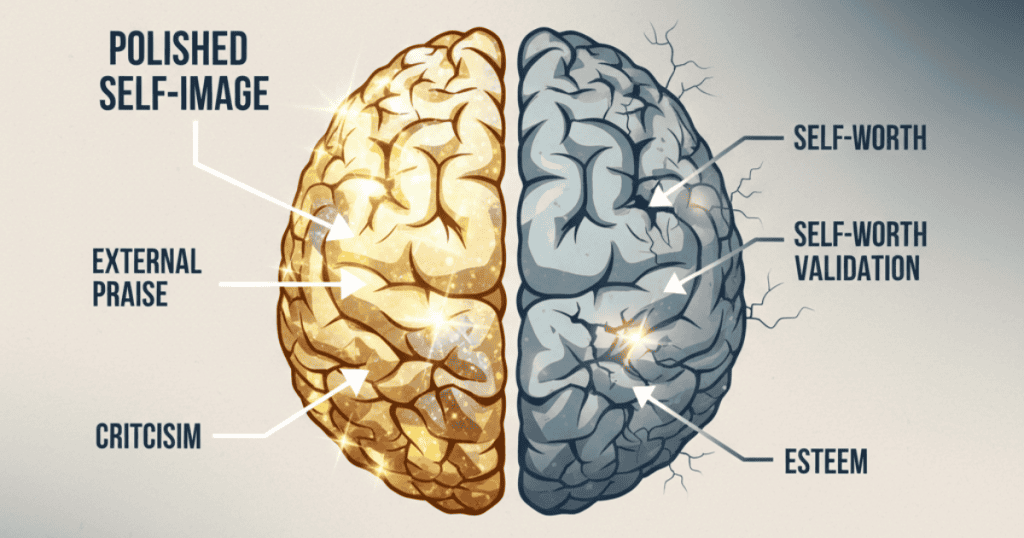Narcissists feed on compliments like oxygen, but only the kind that inflate their ego.
I remember sitting at the kitchen counter, pouring my third cup of coffee while my mother glided past.
She expected the usual barrage of praise for her “perfectly cooked” breakfast.
I had barely said anything when she turned, eyes narrowing. I’d forgotten to compliment the scrambled eggs she’d burned.
Her lip curled, her sigh heavy.
It was always like this: if a comment didn’t spin into her supply, she’d find a way to punish the silence.
For years, I felt trapped in this endless cycle, tiptoeing, calibrating every word to keep the peace.
But over time, I discovered that there’s one compliment that flips the script, one phrase that exposes the narcissist’s deepest fear.
Being ordinary, predictable, and transparent.
It doesn’t stroke their ego. It pierces it.
Table of Contents
Why Narcissists Crave Compliments

Narcissists thrive on external validation to prop up their fragile sense of self.
My toxic brother is a textbook example: every achievement, every minor success, needed amplification.
If I didn’t clap, cheer, or gush, he would sulk or lash out.
Praise wasn’t optional. It was a lifeline. Compliments become a currency of power.
And for those of us living in their orbit, it often feels like walking on glass.
I remember enduring years of my aunt’s “jokes,” only to force laughter and say something flattering just to avoid her spiraling into anger.
The exhaustion of constantly feeding someone’s insatiable need for validation is a kind of quiet torture.
For survivors, this craving for admiration often translates into guilt and anxiety.
You second-guess your words, hoping your praise is sufficient.
I recall the countless times I had to praise my selfish mom for mundane tasks as if these ordinary actions were extraordinary.
Even minor slip-ups in this ritual could trigger passive-aggressive jabs or sulky withdrawal.
The family Christmas when I accidentally praised my brother’s mediocre painting over my mother’s “masterpiece” led to days of tense silence.
Narcissists are addicted to praise because without it, the illusion of their superiority collapses.
It leaves them vulnerable and exposed.
The Compliment That Breaks Them: “Wow, You’re So Predictable”

There’s a phrase that changes the game: “Wow, you’re so predictable.”
I first tried it with my mother after decades of narcissistic manipulation.
She had spun a minor family misunderstanding into a full-blown crisis, trying to guilt-trip me into apologizing for things I hadn’t done.
I paused, looked her in the eye, and said it calmly, “You know, Mom, you’re really predictable.”
Her face froze. The stormy eyes that usually flickered with control and calculation blinked in shock.
That’s all I said. No explanations. No apologies.
She had been performing her “angry mother” routine for decades, and suddenly, I had read the script aloud.
Narcissists crave the perception of mystery, superiority, and control.
Calling them predictable punctures that illusion.
It reveals that you’ve seen through their tactics and you’re no longer playing the role they expect.
That phrase lands like an insult because it exposes the tired, repetitive mechanics behind their charisma.
I later used it with my toxic sister when she launched into a familiar guilt-laden lecture about my “failings” as a niece.
The look of disbelief on her face was immediate. She paused mid-sentence, unsure how to react.
It’s a small, surgical strike that shifts the power back to you.
Why It Works (The Psychology Behind It)

Predictability = Power Loss
Narcissists maintain control through unpredictability.
My brother, for instance, thrived on mood swings. One moment, he’s charming, then the next, he’s explosively angry.
By keeping everyone on edge, he ensured attention and emotional leverage.
But when I calmly told him he was predictable, something shifted. The uncertainty that fueled his power disappeared.
Predictable means you’ve taken away the suspense, the fear, the “game.”
Their carefully curated mystique collapses.
They Fear Being Ordinary
Everything in a narcissist’s toxic world revolves around being special.
My narcissistic mom, the consummate performer, prided herself on being the most charitable, witty, and clever person in the room.
Predictability is the ultimate exposure.
It’s the reminder that beneath the theatrics, they’re using the same worn-out abuse tactics everyone else has seen before.
Ordinary. Transparent. Not special at all.
I watched my sister, who’d spent years spinning dramas over imagined slights, pause for a beat when I used the word “predictable.”
Her arms fell, her sharp tongue dulled.
I had shown her that her elaborate schemes weren’t unique.
That realization shook her more than any confrontation could.
Control Relies on Your Reaction
A narcissist’s power depends on eliciting a reaction: shock, fear, guilt, or submission.
Another narcissistic family member, my aunt, would routinely attempt to provoke tears with cutting remarks.
The day I simply smiled and said, “Predictable,” she recoiled as if I had stripped her of her weapons.
By staying calm and neutral, you starve the narcissist of drama.
No reaction equals no fuel.
They are forced to recalibrate, often in confusion, because their usual manipulations no longer work.
How to Use It in Real Life

Using this phrase isn’t about confrontation. It’s about reclaiming power.
Imagine your narcissistic parent starting a guilt-laden monologue over something trivial.
You pause, breathe, maintain your calm, and deliver: “Wow, you’re so predictable.”
The power lies in delivery.
It has to be casual, steady, and unflinching. No sarcasm, no anger, no explanation. Just clarity.
Then walk away.
Don’t let them spin it back. Don’t argue. Don’t justify yourself.
The moment you stop playing the puppet, they are left with a truth they can’t easily control.
It’s subtle, yet devastating to their carefully constructed illusion of dominance.
I remember using this with my toxic sibling when he launched into a familiar tirade about how I “always ruined family events.”
One calm sentence, one knowing smile, and he stopped mid-rant.
I didn’t need to argue. I had shifted the dynamic without aggression.
Later that evening, even my mother noticed the unusual silence and asked, puzzled, why he seemed subdued.
That tiny ripple of control reminded me that reclaiming power doesn’t need yelling or drama.
It only requires precision, timing, and emotional detachment.
One Phrase Isn’t Enough: Build a Strategy

While “predictable” is powerful, no single sentence can “fix” decades of manipulation.
Survivors need a mindset built on vigilance, awareness, and strategy.
First, expect the tactics. Know their patterns.
I’ve spent years mapping out my toxic mom’s classic moves.
Criticism disguised as advice, guilt trips disguised as concern, and drama disguised as family crises.
Recognizing the patterns makes the manipulations less intimidating and allows you to anticipate their next move without panic.
You begin to see the repetition and can prepare yourself mentally and emotionally before they even start.
Second, create boundaries. Every interaction becomes a chessboard.
If my sister starts a smear campaign, I decide: do I respond, deflect, or walk away?
Every choice strengthens my control and weakens the narcissist’s.
Boundaries can be small, like a short reply instead of a long explanation, or larger, like limiting contact entirely.
Finally, don’t rely on emotion. These encounters aren’t about venting or “teaching them a lesson.”
They’re about maintaining sovereignty over your reactions.
When my brother tried to bait me into an argument last month, I smiled, delivered my line, and left.
No drama. No guilt. Pure strategy.
Each interaction becomes a lesson in discipline and calm, a reminder that you are no longer a puppet in their game.
The Sentence That Breaks Their Script

Living with narcissists, especially in a family, is exhausting.
Every word and action must be measured against potential backlash.
I spent years anticipating my mother’s moods, my sister’s manipulations, and my brother’s fits.
The shift comes when you realize their behavior isn’t clever or unique.
It’s a script: repetitive, transparent, predictable. Once you see it, you’re no longer a participant.
That’s when the phrase lands, “You’re so predictable.”
It’s more than a sentence. It’s a declaration. It signals you’ve stepped out of their theater, no longer performing on cue.
Nothing terrifies a narcissist more than losing control.
I recall my aunt’s passive-aggressive critique of my choices. I looked her in the eye, smiled, and said, “Predictable.”
She froze. I walked away, calm, unbothered.
For the first time, I felt free from the script.
Calling a narcissist predictable is strategic.
You reclaim power in a world designed to exhaust you.
With a calm voice, a steady smile, and one word, you reclaim your agency.
When you call them predictable, you prove you’ve stopped being their puppet.
And nothing terrifies them more than losing control over your reaction.
For me, the freedom was profound. For every survivor reading this, it can be yours too.
Strategic, calm, unapologetic. That’s how you reclaim your power, one predictable script at a time.
Related posts:
- 15 Ways to Say “No” That Narcissists Can’t Spin Back on You
- How to Deal With a Narcissist Who Hates You (And Still Win)
- 7 Masks Narcissists Hide Behind (And How to Rip Them Off)
- 12 Daily Habits That Keep You Sharp and Strong After Narcissistic Abuse
- 8 Non-Negotiable Rules I Live By Every Time a Narcissist Crosses My Mind


